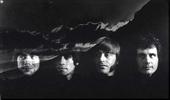Out of the same Pacific Northwest climate that produced garage rock legends the Sonics, the Kingsmen, the Wailers, and Paul Revere & the Raiders, the Bards formulated in Moses Lake, WA, in 1961. Evolving out of late-'50s teen cover combo named the Fabulous Continentals, the band was originally a perpetually shifting five-piece mainly consisting of Moses Lake High School students. When lead vocalist John Draney left to join the army in the early '60s, the group's lineup finally solidified as the quartet of keyboardist Mike Balzotti, guitarist Mardi Sheridan, drummer Bob Galloway, and bass player Chuck Warren. Using a Roget's Thesaurus to select a name that would give their enterprise an English ring, they became the Bards.
The band began releasing singles in 1966, putting out a slew of 45s on such prominent labels as Picadilly, Panorama, Jerden, and Parrot, but its first big break came when Capitol Records released its cover of the Curtis Mayfield tune "Never Too Much Love" nationally in 1967. Although it failed to chart on Billboard, the single reached number 67 in the Cash Box Top 100 and gave the Bards the opportunity to tour with major acts like the Animals, the Dave Clark Five, the Rascals, and the Turtles. By this point, the Bards already had developed into an enormously popular live draw locally and had toured nearly every Northwest dance hall, radio station, and club.
Sheridan briefly left the band in 1967 to journey to San Francisco, but he returned to the lineup shortly thereafter, at which point the foursome decided to light out for Los Angeles, with tapes in hand, to search for a producer. In Hollywood, they serendipitously ran into Curt Boettcher in an elevator and he offered to listen to their recordings. Liking what they heard, the producer and his partner Keith Olsen decided to work on the Bards' first album. Unfortunately, this also eventually led to the band's breakup. The members re-christened themselves Moses Lake and released a single on Boettcher and Gary Usher's Together Records. But after the album was finished, Boettcher suggested he return to the Northwest with the quartet to act as its lead singer, delighting Balzotti and Sheridan. Warren and Galloway, on the other hand, were less thrilled with the idea, preferring to return to the band's old gig circuit. The former duo ended up dropping out of the group and returning to Hollywood to pursue songwriting and recording careers, while the latter pair put together a new version of the band and continued playing throughout the Northwest.
The Boettcher-and-Olsen album remained unreleased until Gear Fab reissued it on CD at the outset of 2002 as The Moses Lake Recordings. A second album, First American, recorded in 1969, also went unreleased until appearing on vinyl on Picadilly in 1980. Balzotti later returned to Seattle and played in a duo as the Michaels with fellow songwriter Michael Langon.
It took over 30 years to shake loose The Moses Lake Recordings, yet another Curt Boettcher-Keith Olsen production, from the befuddled chaos of 1960s rock. The album is obscure even by the producers' normal standards. It is also atypical of almost everything else for which the pair was responsible. The main reason for the anomaly is, of course, the Bards, a band not only drastically different from any other combo out of the Pacific Northwest but staggeringly unique in the genre. Boettcher and Olsen, in turn, responded with an equally idiosyncratic production, experimenting with buoyant horn charts and early synthesizer washes. Their characteristic touch is most evident in the harmony arrangements, but the music is considerably more aggressive than any of their other work. That is partly attributable to the Bards' garage roots, which shine through in the ragged fuzz guitars, the barrelhouse keyboard runs, and the unstinting toughness of the quartet's playing. On the other hand, this is not garage in any normal sense of the word. The album, in fact, doesn't come within miles of colliding with normal. It is one of the most off-the-wall relics of the era, a convergence of garage rock, boogie grooves, weird bubblegum, and seriously funky pop/rock. Chief among its oddities are the songs themselves, which tend to defy any, let alone easy, classification. The fabulous "Laredo" flows from a spoken word segment into a flirtatious battle between the lead guitar and collective group scatting. "Oobleck" somehow squeezes black magic, Seussian wordplay, seriously bad mojo, and jubilant harmonies into a deranged, two-and-a-half-minute psychedelic singalong. "Reluctantly and Slow" segues from jazzy beatnik rhythms into discordant, gothic gospel and back to finger-snapping cool. And it's impossible to know what to even consider, much less call, the album's centerpiece, the 14-minute, seven-part "The Creation." A mini-rock opera? A conceptual suite? A progressive acid epic? A stoned rewriting of Genesis? Needless to say, it encapsulates in microcosm all that is eccentric about the album as a whole. Which is not to suggest that the album deserved its obscurity, only that it is no surprise that a record label of the day would have passed on releasing it, given how willfully non-commercial and non-mainstream it is. Garage purists might come away from the album unsatisfied -- there is no "Louie Louie" here, no "The Witch." Nevertheless, The Moses Lake Recordings is an awesome lost gem, always fascinating and often astoundingly good. Even at its most bizarre, it is packed, sometimes a dozen to the song, with ideas. ~ Stanton Swihart, All Music Guide
